|
|
|
Sort Order |
|
|
|
Items / Page
|
|
|
|
|
|
|
| Srl | Item |
| 1 |
ID:
197035


|
|
|
|
|
| Summary/Abstract |
This research tries to reach an understanding of the relationship between youth, land, and livelihoods through an analysis of incidents of land self-provisioning by youth in a former labour reserve. Research was conducted in three villages over a 10-year period following what became known as ‘siziphile’ land occupations. The research contributes to contemporary debates on the youth employment, youth land struggles and livelihoods. This is done through the conceptual understanding of worker-peasantry dynamics. The fact that nearly all land occupants had abandoned the occupied land 10 years after the occupations attests to the complexity of issues around land and livelihoods in a worker-peasantry context. The conclusion emerging from this research is a contestation over the ‘land the economy and economy is land’ narrative, and argues that youth land struggles are not necessarily struggles for livelihoods, particularly among worker-peasants.
|
|
|
|
|
|
|
|
|
|
|
|
|
|
|
|
| 2 |
ID:
169033
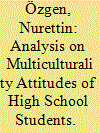

|
|
|
|
|
| Summary/Abstract |
This study explores the links between multiculturality attitudes displayed by high school students and their ethnic identity, religious beliefs, self-identification, and place of residence. The study is based on questionnaires from 2823 students in 17 cities in seven geographical regions across Turkey. A five-dimension Multiculturality Attitude test was used, which consists of 21 items and was developed by the authors. The data were analyzed with the non-parametric tests Kruskal–Wallis and Mann–Whitney-U. According to the results, there are statistically significant differences across all categories of the scale.
|
|
|
|
|
|
|
|
|
|
|
|
|
|
|
|
| 3 |
ID:
101987
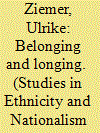

|
|
|
|
|
| Publication |
2010.
|
| Summary/Abstract |
This paper examines the question of long-distance nationalism and Armenian youth in contemporary Russia. It contributes to existing debates on diasporic cultural identities and shows that long-distance nationalism is not simply an elite-driven phenomenon, but involves complex cultural, political, and symbolic processes and practices. Drawing on data obtained during six months of ethnographic fieldwork amongst Armenian youth in the city of Krasnodar, Southern Russia, it will be shown that young Armenians exhibit aspects of diasporic long-distance nationalism in different ways. While young Armenian men hold on to cultural traditions and practices that are formed in the past, female research participants have started to challenge them.
|
|
|
|
|
|
|
|
|
|
|
|
|
|
|
|
| 4 |
ID:
094926
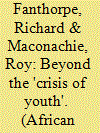

|
|
|
|
|
| Publication |
2010.
|
| Summary/Abstract |
Sierra Leone's conflict has often been characterized as a 'crisis of youth'. For some, the post-war resurgence of grassroots associational life represents the unleashing of long-suppressed youth egalitarianism, yet this analysis tends to ignore the role of international aid in providing an economic incentive for impoverished Sierra Leoneans to embrace formal association. Case study evidence also shows that politics of 'community' identification and moral economies of patronage continue to affect post-war aid. Evidence of post-war social change can nevertheless be found outside the development sector. Diamond mining has long served as a driver of cultural modernization in Sierra Leone and detailed examination of post-war associational life in Kono District reveals that new foci and techniques of social activism have emerged since the end of the civil war. The decline of artisanal mining, with the expansion of large-scale industrial mining, and renewed interest in farming are driving a parallel resurgence of associational life in rural areas. Given that most Sierra Leoneans continue to depend on farming, this rural resurgence could yet represent the most durable basis for democratic change in Sierra Leone.
|
|
|
|
|
|
|
|
|
|
|
|
|
|
|
|
| 5 |
ID:
160357
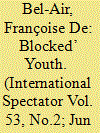

|
|
|
|
|
| Summary/Abstract |
Migration from South and East Mediterranean (SEM) countries has been considered a growing security threat in the EU and Gulf states following the 9/11 attacks and the Arab uprisings. Since 2011, the economic slowdown, regime changes and socio-political instability have spurred growing migration pressure from SEM countries. However, the securitisation of migration of young citizens from these countries in the EU and the Gulf states is manifested in the drastic limitation of migrants’ inflows, and in the selection of prospective migrants on demographic, socio-economic and political grounds. Today’s ‘governmentality’ of youth migration from SEM countries poses ethical and development-related issues.
|
|
|
|
|
|
|
|
|
|
|
|
|
|
|
|
| 6 |
ID:
180644
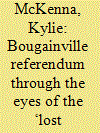

|
|
|
|
|
| Summary/Abstract |
A referendum to decide on Bougainville's future political relationship with Papua New Guinea was held in November 2019. The deferred, non-binding, referendum is a key milestone contained in the Bougainville Peace Agreement (BPA), which sought to reconcile a violent conflict from 1988 to 1998. Although the Bougainville peace process has been deemed a success and significant milestones have been reached towards implementation of the BPA, the conflict continues to have enduring impacts. Particular concerns have been raised about Bougainville's large youth population, often referred to as the ‘lost generation’. This paper documents observations of the 2019 referendum from the perspective of four university students born during the conflict in Siwai District, South Bougainville, whom participated officially in the referendum as an observer group. While trauma and a disrupted education have contributed to youth unemployment and substance abuse in Bougainville, the paper offers a stark contrast to negative narratives of young Bougainvilleans as lacking capabilities to contribute to social and political life. As Bougainville embarks on yet another period of political uncertainty, the paper calls for greater attention to finding avenues to support these young voices to ensure that their generation is not ‘lost’ forever.
|
|
|
|
|
|
|
|
|
|
|
|
|
|
|
|
| 7 |
ID:
176566


|
|
|
|
|
| Summary/Abstract |
The status of Northern Ireland has been at the heart of the Brexit impasse. Using semi-structured interviews of political elites and an original survey experiment administered to young people on both sides of the Irish border (N = 771), this study analyzes Brexit’s impact on identities and territorial attachments on the island of Ireland. The results demonstrate that political elites perceived that Brexit had greatly exacerbated intergroup tensions; whereas the survey experiment only identified a significant influence of Brexit on territorial attachment in the Republic of Ireland, and no significant effect of Brexit on attitudes was measured in Northern Ireland.
|
|
|
|
|
|
|
|
|
|
|
|
|
|
|
|
| 8 |
ID:
101292
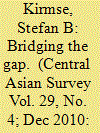

|
|
|
| 9 |
ID:
188744
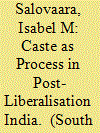

|
|
|
|
|
| Summary/Abstract |
The task of recent scholarship on India’s post-liberalisation period has been, in part, a re-casteing: a deliberate investigation of the ways in which historically embedded hierarchical divisions are continually reworked and thereby reinvigorated. Amid contemporary debates over the forms, sites and effects of caste and caste discrimination, this article identifies a shift in critical scholarship towards understandings of caste as process. Processual readings of caste within market- and merit-based institutions productively reframe caste in India from a ‘relic’ undergoing erosion to an accretion of new layers and logics upon older principles of innate human value.
|
|
|
|
|
|
|
|
|
|
|
|
|
|
|
|
| 10 |
ID:
148944
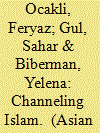

|
|
|
|
|
| Summary/Abstract |
Pakistan's religious television programs have drawn significant attention in both academic and policy circles. However, there has been surprisingly little systematic analysis of their content and influence. This article shows that, although the televangelists featured on the Pakistani television channels present some of the most conservative views regarding the role of women and religious minorities in society and the role of Islam in governance, Pakistani television is an arena of contestation. The impact of the lively debates between televangelists on young viewers—over whom the ideological battles are being waged—is mixed. Findings from an original survey of Pakistani students and political activists suggest that young people in Pakistan watch religious shows only occasionally. Those that do, however, take them seriously. What leads young people to consume religion on television is a sense of social responsibility: that they are doing it not just for themselves, but also—and perhaps more importantly—for others, be it their families or communities.
|
|
|
|
|
|
|
|
|
|
|
|
|
|
|
|
| 11 |
ID:
164031
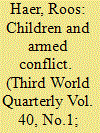

|
|
|
|
|
| Summary/Abstract |
Children are currently being recruited to an increasing extent by armed groups, assuming both ancillary and combat roles. Academic research on this phenomenon has grown in scope over the last few years. However, the current research lacks a comparative perspective. As a result, we presently have a very restricted perspective of the state of the art on the subject of child soldiering, making it difficult to recognise research areas that urgently require further investigation. The ambition of this article is twofold: first, to explore the existing state of child soldier studies across disciplines, and second, to encourage potential research by highlighting three relatively underdeveloped research areas.
|
|
|
|
|
|
|
|
|
|
|
|
|
|
|
|
| 12 |
ID:
160501
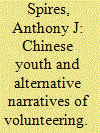

|
|
|
|
|
| Summary/Abstract |
Over the past 20 years, volunteering has developed as a new field for governmental control and regulation of an emergent civil society. This article draws on interviews with 60 young volunteers in southern China, mostly university students and recent graduates. I contrast their experiences in off-campus, youth-led voluntary associations with the officially approved student organizations of normal university life. I argue that the instrumental organization of volunteers characterizes the party-state’s efforts to funnel youthful enthusiasm and compassion into particular political projects and officially prescribed goals. Unhappy with the ‘formalistic’ nature of these activities, youth engaging in bottom–up volunteer initiatives articulate other priorities, including a strong desire for meaningful, personal engagement that state-led programmes and university student organizations are typically unable to provide.
|
|
|
|
|
|
|
|
|
|
|
|
|
|
|
|
| 13 |
ID:
170189
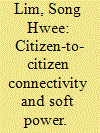

|
|
|
|
|
| Summary/Abstract |
This article takes as its object of analysis the term ‘little freshness’ (xiao qingxin 小清新), which has been coined to describe a variety of cultural products and phenomena, mostly emanating from Taiwan but circulating across the Taiwan Strait. It argues that little freshness is a manifestation of subcultures that have been initiated, appropriated, and consumed by youths in the region. This citizen-to-citizen connectivity reworks Joseph Nye’s notion of soft power by shifting the focus away from state agents and by reversing the direction of soft power flows to claim agency at the sites of reception. The article provides two case studies to demonstrate how an imaginary about Taiwan’s cleanness, clearness, and freshness has been projected by the media in the People’s Republic of China as a form of discursive construction and by Hong Kong citizens of Taiwan as a desirable destination for emigration. Finally, the article situates the little freshness phenomenon in relation to a propensity towards miniaturization in cultural formation in the region, and suggests that this propensity is inflected in a structure of feeling about generational injustice in the face of neoliberal capitalism.
|
|
|
|
|
|
|
|
|
|
|
|
|
|
|
|
| 14 |
ID:
073550
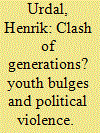

|
|
|
|
|
| Publication |
2006.
|
| Summary/Abstract |
It has frequently been suggested that exceptionally large youth cohorts, the so-called "youth bulges," make countries more susceptible to political violence. Within two prominent theoretical frameworks in the study of civil war, youth bulges are argued to potentially increase both opportunities and motives for political violence. This claim is empirically tested in a time-series cross-national statistical model for internal armed conflict for the period 1950-2000, and for event data for terrorism and rioting for the years 1984-1995. The expectation that youth bulges should increase the risk of political violence receives robust support for all three forms of violence. The results are consistent both with an expectation that youth bulges provide greater opportunities for violence through the abundant supply of youths with low opportunity costs, and with an expectation that stronger motives for violence may arise as youth bulges are more likely to experience institutional crowding, in particular unemployment. Some contextual factors have been suggested to potentially enhance the effect of youth bulges. In an empirical test of these propositions, the study suggests that youth bulges are particularly associated with an increasing risk of internal armed conflict in starkly autocratic regimes, but a similar effect is also found for highly democratic countries. The interaction of youth bulges with economic decline and expansion in higher education appear to increase the risk of terrorism but not of rioting. Recent studies in economic demography find that when fertility is sharply decreasing, causing lower dependency ratios, large youth cohorts entering the labor market may lead to economic boosts. This study finds some empirical evidence complementing these results, indicating that the effect of youth bulges on political violence may decline along with reduced dependency ratios.
|
|
|
|
|
|
|
|
|
|
|
|
|
|
|
|
| 15 |
ID:
153422


|
|
|
|
|
| Summary/Abstract |
Cambodia’s youthful population is significantly responsible for a recent unexpected decline in the popularity of the Cambodian People’s Party, which has governed since the end of the Khmer Rouge regime. This increasingly young electorate has lived through an era of peace and openness with regular multi-party elections and impressive economic growth resulting in rapid structural change in the economy. Compared to their parents’ generation, this younger generation is better educated, highly mobile, aspires to salaried employment, and is well connected to new sources of information and technology. Because of this, their expectations, aspirations, opportunities, as well as challenges they face are remarkably different from those of older generations. However, Cambodia’s institutions of governance, dominated by personalized and patron–client networks that have been propped up by the ruling elite, has effectively marginalized this emerging youth population. This marginalization from political and economic resources has produced alienation and discontent, which represents a significant political problem for the ruling party’s political strategies.
|
|
|
|
|
|
|
|
|
|
|
|
|
|
|
|
| 16 |
ID:
091784


|
|
|
|
|
| Publication |
2009.
|
| Summary/Abstract |
Although bomba remains a largely understudied musical genre, the majority of studies on bomba have focused on the historicizing or anthropological detailing of bomba as an Afro-Puerto Rican musical tradition. Recognizing the importance of these initial studies, this article critically interrogates the gendered dimensions of bomba dancing as well as the historical and structural implications imbued within colonial and racialized contexts. In short, the gendered division of cultural labor in bomba has received notable recognition, whereas bomba as a racialized and "gendered experience/expression" has not been sufficiently explored. The performers mentioned in this study include two youth bands as well as audience members from the San Juan metropolitan area (between the ages of 18 and 30) who participated in an ethnographic study during the summer of 2002. Based on this fieldwork and data, this presentation uses the historically "situated imaginaries" of these youth performers as means to understand the ways in which bomba is used and experienced differently by female and male practitioners (Stoetzler and Yuval-Davis 2002). This article maintains that (1) the relationship between dance partners remains marginal in meaning infused contexts of bomba and that (2) bomba as experienced by the performers in this study provides a useful research lens for reexamining both popular and colonial representations of gender performance within the public and private spheres in Puerto Rico.
|
|
|
|
|
|
|
|
|
|
|
|
|
|
|
|
| 17 |
ID:
097962
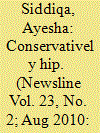

|
|
|
| 18 |
ID:
092062
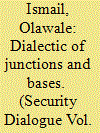

|
|
|
|
|
| Publication |
2009.
|
| Summary/Abstract |
This article examines the involvement of youth - constructed as 'area boys' and 'area girls' - in crises of order in downtown Lagos. It explores the emergence of 'bases' and 'junctions' as modes of organization and differentiation between and among youth in urban Lagos. A 'base' is a neighbourhood meeting place where youths gather to relax, recreate, and discuss sports and politics. A 'junction' is where social miscreants, street marauders and touts congregate to exploit money-making opportunities. It is my argument that bases and junctions embody distinct, yet connected, forms of subcultures that are simultaneously imbibed and projected by members. Moreover, they constitute emergent forms of territoriality constructed around spaces of leisure, residence and commerce, manifested in extrastate regimes of (dis)order in downtown Lagos. The article unpacks the involvement of members of junctions and bases in the provision of (dis)order as 'securo-commerce' - payment of different kinds of fees and levies to purchase security or forestall insecurity in downtown Lagos.
|
|
|
|
|
|
|
|
|
|
|
|
|
|
|
|
| 19 |
ID:
160102
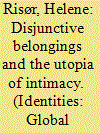

|
|
|
|
|
| Summary/Abstract |
The paper analyses practices of intimacy among youth in a poor, crime-ridden neighbourhood of Santiago. It argues that their sense of belonging to their neighbourhood and broader society is disjunctive: they inhabit the nation-state without complying with expectations of proper citizenship. Similarly, they dwell in their neighbourhood without identifying with it. Instead, they turn to intimate relations with friends and lovers as spaces of belonging. Through these often failing relationships, they pursue emotional and socio-economic stability and seek to fulfil expectations of social becoming and mobility. These intimate and romantic practices can both be understood as an utopian, affective promise that allows for imagining possibilities of a good life and as a moral exercise in the realisation of an adjacent self and we argue that intimacy constitutes a key site in the quest for social belonging among subaltern youth in neoliberal Chile.
|
|
|
|
|
|
|
|
|
|
|
|
|
|
|
|
| 20 |
ID:
158426
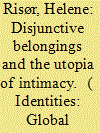

|
|
|
|
|
| Summary/Abstract |
The paper analyses practices of intimacy among youth in a poor, crime-ridden neighbourhood of Santiago. It argues that their sense of belonging to their neighbourhood and broader society is disjunctive: they inhabit the nation-state without complying with expectations of proper citizenship. Similarly, they dwell in their neighbourhood without identifying with it. Instead, they turn to intimate relations with friends and lovers as spaces of belonging. Through these often failing relationships, they pursue emotional and socio-economic stability and seek to fulfil expectations of social becoming and mobility. These intimate and romantic practices can both be understood as an utopian, affective promise that allows for imagining possibilities of a good life and as a moral exercise in the realisation of an adjacent self and we argue that intimacy constitutes a key site in the quest for social belonging among subaltern youth in neoliberal Chile.
|
|
|
|
|
|
|
|
|
|
|
|
|
|
|
|
|
|
|
|
|